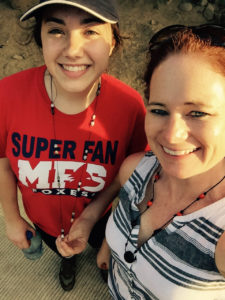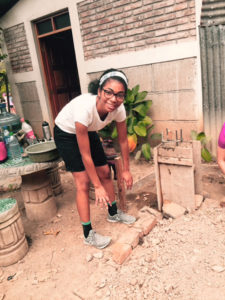
Student and teacher wearing seed necklaces made by a women’s cooperative at Casa del Nino
Last week I was sitting in a meeting with Bishop Stokes of the Episcopal Diocese of New Jersey. We were discussing how to grow our small church congregation. The Bishop suggested that we go into the community and fulfill a need. One older church member suggested that we had already met with an after school program director and told them how to raise money, and she didn’t take our advice so we were feeling discouraged. Canon Phyllis Jones who was accompanying the Bishop then said, “Did you ask them if that was what they needed?”
I nodded with understanding because my recent experience with ProNica in Nicaragua had helped me to understand the concept of solidarity. However, other church members continued to argue and struggle with this idea of asking what people need instead of assuming we know what they need. The concept of solidarity is both universal and universally hard to grasp.

Work project at Casa del Niño to level the ground for a new music pavilion
One of the greatest challenges I faced while traveling with fifteen high school students in Nicaragua was helping them to understand the concept of international service learning as an alternative to international service work. They wanted to “do” something and give of themselves in a tangible way. The idea that our labor was anything more than cursory became abundantly clear when we were slowly chipping away at a stump of a tree and taking numerous water and rest breaks, while our bus driver Manuel, who was under no obligation to help at all, took a few swings at the stump and it was gone. It became apparent that there were plenty of men in San Ramon who could have levelled the ground for an outdoor music pavilion for Casa del Niño in an afternoon, and it took us three days. They didn’t “need” our help, but by levelling the ground for the music pavilion we were given the opportunity to have a relationship exchange with the students who were taking music lessons at Casa del Niño and the staff.
Ultimately it was our shared Quaker traditions that helped us to connect with ProNica’s community partners. Our students sang “We are marching in the light of God” to reciprocate the musical performance by the students at Casa del Niño. And if we truly espouse the Quaker values taught at Moorestown Friends School, seeing the light of God in everyone should be the most compelling reason for engaging in solidarity work rather than service work. Solidarity levels the playing field, a concept that is so important for privileged North America youth to begin understanding now.
